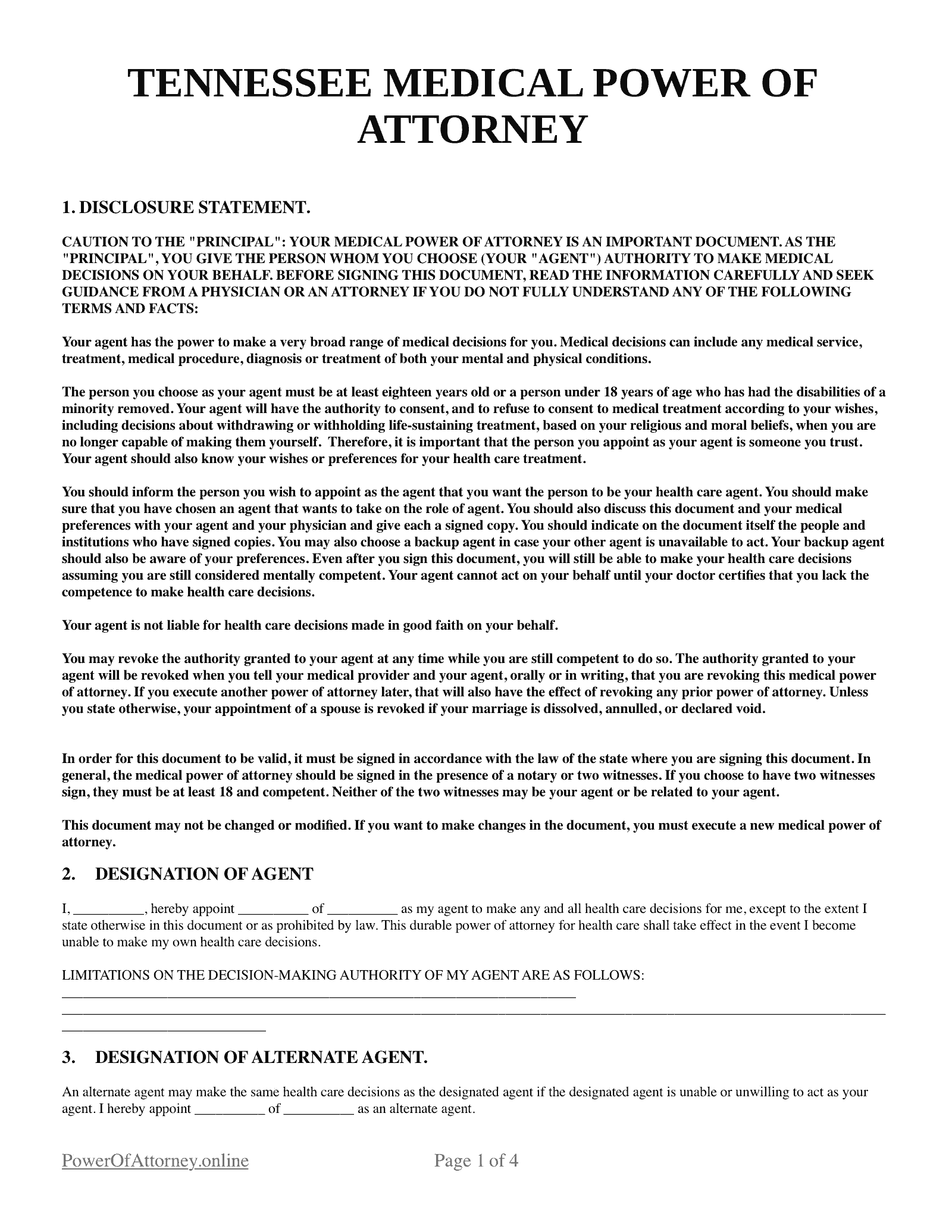Free Tennessee Medical Power of Attorney Form
A power of attorney (POA) is a legal document that allows a person to act on behalf of another in various matters. It can be a blanket authority or a specific one. A POA specifically intended for medical matters is known as a medical or healthcare power of attorney. With a Tennessee medical POA, the agent is allowed to make medical decisions on behalf of the principal.
The Tennessee Medical POA permits the agent to decide on the principal’s medication, treatment, surgery, end-of-life care, and residential facility. It is always durable so that the principal’s medical care is not at any time hampered by their incapacity.

Medical Power of Attorney Form Tennessee Laws
- Access to Medical Records and Information - Because the agent has similar rights to the principal when the latter becomes incapacitated, the agent has the right to access medical records. The law states, “An attorney-in-fact designated to make health care decisions under the durable power of attorney has the same right as the principal to receive information regarding the proposed health care, to receive and review medical records, and to consent to the disclosure of medical records” (TN Code § 34-6-206).
- Requirements - There are requirements to becoming an agent under the medical POA in Tennessee. For example, a healthcare provider treating the principal and the employees of the healthcare institution where the principal is being treated cannot become agents. The same goes for an appointed conservator (TN Code § 34-6-203).
Signing Requirements in Tennessee for Medical POA
The principal must sign the POA to make it official. In order to make it legal, a notary public must attest to it. If a notary public is not available, two witnesses can attest to the validity of the document.
According to the law, “A witness is a competent adult, who is not the agent, and at least one of whom is not related to the principal by blood, marriage, or adoption and would not be entitled to any portion of the estate of the principal upon the death of the principal” (TN Code § 34-6-203).
Obtaining a Tennessee Medical Power of Attorney Form
If you need a free medical Power of Attorney form, Tennessee residents can now access them online.
Additionally, there are options to download a Tennessee medical Power of Attorney PDF, which can be printed and filled out manually.
By utilizing these resources, you can ensure that all aspects of your healthcare are managed according to your wishes, even if you become unable to make these decisions yourself.
How to Write a Medical POA in Tennessee
Here is a step-by-step guide to writing a medical POA in the state of Tennessee
1. Choose an agent you can trust with your life
The first step to making a medical Power of Attorney TN is also the most important. Choose an agent that you can trust with your life since they will be making decisions on your medications, treatments, medical surgeries and procedures, end-of-life care, and residential facility.
In many cases, the principal chooses someone close to them as their agent. It could be the spouse, sibling, child, or parent. This choice makes sense because the family only wants what’s best for them.
Others prefer someone who can make unbiased decisions, someone like a lawyer, a business partner, or a distant relative. This is because healthcare POA includes difficult end-of-life decisions.
2. Discuss the content of the POA with your agent
Inform the agent about your preference in every aspect of your healthcare. It is crucial that the agent is aware of your wishes, as many of these may be carried out at a time when you are no longer mentally competent to make sound decisions. The healthcare POA is always durable, which means the agent has the right to act for the principal even after the principal has been declared legally incapacitated.
It is also wise to discuss compensation. Most agents, especially when they are related to the principal, would not ask for compensation. However, it is still ideal to bring it up as they have the right to accept an honorarium for the responsibilities.
3. Download the Tennessee Medical POA template
Use an online printable Medical Power of Attorney form TN for your convenience. Make sure it follows the format acceptable in Tennessee. Fill out the form and include as many details as you want about your healthcare.
4. Sign the Medical POA form
Review the content of the document. When you are satisfied with everything on it, sign the document and write down the date of the signing. To make it legal and official, allow a notary public to acknowledge its validity. In the absence of a notary public, you can ask at least two witnesses to affirm the document and its information.
5. Use the document
The agent can now start making decisions on the principal’s behalf. The authority continues to exist even when the principal has been declared mentally incompetent. The agent must always carry the original copy of the document, as physicians and other healthcare personnel will need to see the copy every time the agent makes a decision.